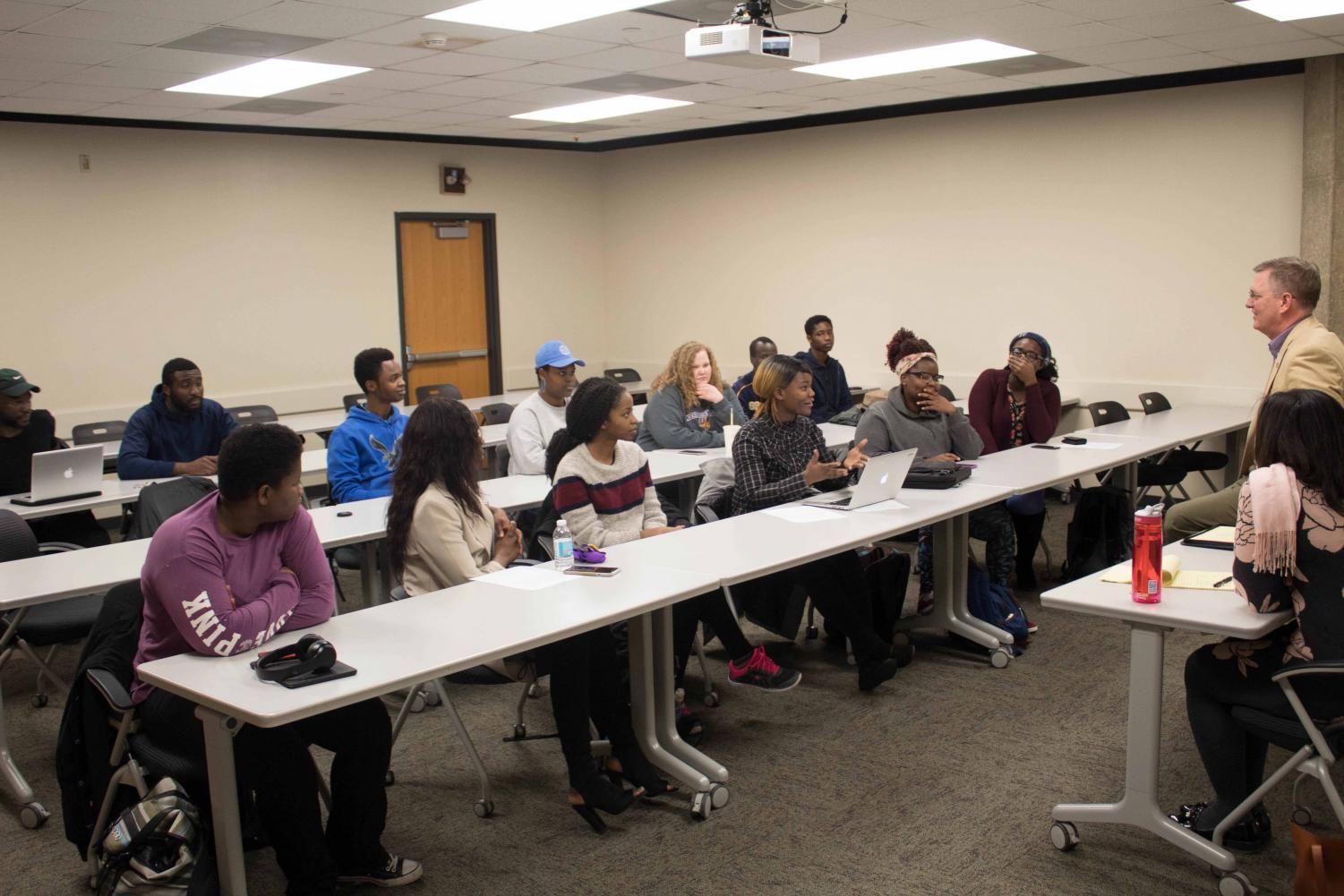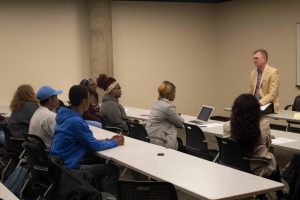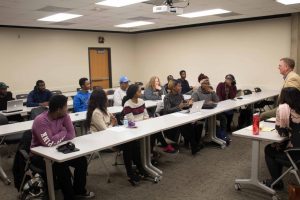President Nook meets with African Union
Mar 5, 2018
President Nook spoke to UNI’s African Union (AU) Tuesday, Feb. 27 in the State College Room of Maucker Union to discuss UNI’s lack of response to President Trump’s comments regarding “s—hole countries.”
In January, President Trump allegedly called Haiti and other nations, reportedly including African nations and El Salvador, “s—holes”. Although the story was never officially confirmed — and no apology rendered — various high-ranking American officials did not deny the comment was made. The comment itself was not what most angered members of the AU, however; it was inaction by the university to show solidarity with students from the countries the President reportedly disparaged.
“For us not to [hear] anything from the administration made us feel worse,” said Tulia Mulibinge, president of the AU. “We saw, for other student groups, the administration come out and say, ‘This is not how the university feels.’”
Mulibinge is referring to emails previously sent by President Nook to students and staff at UNI addressing actions by the Trump administration.
On Jan. 30, 2017 Nook sent a memo to students notifying them of an executive order not allowing persons to enter into the United States from seven countries. On Sep. 6, 2017 Nook informed students of Attorney General Jeff Sessions plan for a six-month phase out of the Deferred Action for Childhood Arrivals (DACA) and that resources were available for impacted students.
Nook argued the circumstances of Trump’s comments did not warrant a response.
“It was my decision, not a member of my team. The ones that I have sent out were because of actual policy changes,” Nook said, referring to situations like that of DACA. “The other one […] the executive order, [students] might not be able to get back if they went home.”
The meeting, which included Chief Diversity Officer (CDO) and Assistant to the President Gwenne Berry, then turned into a discussion about the struggles that students of African descent face on campus.
“How am I supposed to feel safe on a campus where students do agree with the president’s [statement]?” Mulibinge asked. “How will the university ensure that these African students feel comfortable on a campus that is so Caucasian?”
According to UNI’s Fact Sheet report from 2016, Black/African American undergraduate and graduate students comprise 330 of the total 11,905 enrolled population of students — 2.8 percent. UNI’s faculty precisely mirrors the ethnic diversity of the student population. Out of 537 faculty members, only 15 identify as Black or African American, which is also 2.8 percent.
“When I first came to this university they would ask you to get into groups, and guess who would be left alone? Me,” Milibinge said.
“It’s about body language,” said Gorpu David, the Vice President of AU. “The person might say they want you in your group; the expression on their face tells you they don’t want you in their group.”
The University has implemented various initiatives to combat racism in the classroom.
Two years ago, Susan Hill, director and professor at the Center for Excellence in Teaching and Learning, put on a series of workshops for professors, training them on how to ensure inclusion of minority students by not allowing students to choose groups, as well as racial sensitivity training. The Center for Multicultural Education (CME) offers listening sessions and attempts to provide a place for persons of color to feel comfortable on campus.
However, the AU feels as if this is not enough.
“When I visit the CME, I still feel like a minority,” said Rose Gamamou, a sophomore communications major, describing her experience on campus. “I don’t know where to go to feel comfortable; you pay the same tuition and we’re [still] getting treated unfairly. Is it because I’m black, but I’m also African, and I’m a woman?”
The discussion ended in a conversation between students, President Nook and CDO Berry. Berry, herself a woman of color, stood in solidarity with the students in attendance.
“My heart hurts for you because I am watching a battle that should have been won 50 or 60 years ago,” Berry said. “You always have me and you always have our President [Nook].”
“Things won’t change tomorrow; we are working on things, but we’re talking about changing cultures,” Nook said. “Rocket science is easy compared to what we’re talking about here. This institution has been at it for more than 50 years, and we’re not there yet.”
A student who wished to remain anonymous ended the night by summing up the feelings toward President Trump that many African students in attendance shared — which they made clear by a chorus of finger snaps, nodding heads and audible expressions of agreement.
“For [Trump] to compare a country that I love so much to a s—hole, that kind of hit hard,” said the student. “Some people work hard their whole lives in these s—hole countries to be able to come here, and we’re not being acknowledged at all. Racism, misogyny, xenophobia, that’s what I see President [Trump] as, and he’s not changing.”

















